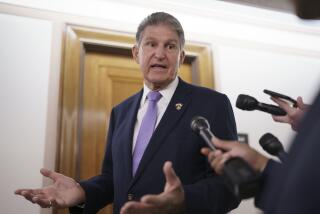Democrats Still Seek Acceptable Health Formula : Reform: Gephardt, Mitchell need a version that can pass both houses. Gore stresses benefits for the middle class with universal coverage.
- Share via
WASHINGTON — With Congress expected to vote on health reform within the next few weeks, Vice President Al Gore on Sunday re-emphasized what has become the Administration’s rallying cry: That the middle class has the most to gain from a bill guaranteeing health insurance to all.
Meanwhile, Democratic congressional leaders reaffirmed their commitment to President Clinton’s basic health care reform goal of universal coverage but indicated they have yet to find the right formula that can assure that both houses will pass such a bill.
The Administration and congressional leaders hope their arguments regarding the middle class will sink in in the final days before the legislation reaches the floors of both houses. They are trying to counter what they believe is the politically damaging impression that health overhaul is yet another big government program that will benefit the poor at the expense of the more affluent.
“It’s important to understand what group of Americans universal coverage is aimed at,” Gore said on NBC-TV’s “Meet the Press.” “The poor have many programs, but because of the Medicaid program, they have health care. The wealthy can do very well buying their own health insurance.”
But, he added, “middle-income families are the group that are at risk of losing their insurance.”
Gore appeared on the program with Senate Majority Leader George J. Mitchell (D-Me.) and House Majority Leader Richard A. Gephardt (D-Mo.). All three emphasized that universal coverage is a goal to be obtained over a number of years, not immediately.
Congressional leaders are exploring whether they might win more votes if they delay the onset of a so-called employer mandate. That provision, which is a requirement that employers pay up to 80% of the cost of their workers’ health insurance premiums, is the most controversial element of Clinton’s approach to health reform.
Gore said that debate has shifted toward a two-stage plan in which the mandate would be the fallback if other reforms fail to boost sufficiently the number of people who have health insurance.
However, Mitchell said that such an approach--known as a “hard trigger,” in the tortured jargon of Capitol Hill--is only one of the options that he is considering.
“I haven’t made a final decision. I’m still in the process of consulting with other senators,” Mitchell said.
Congressional sources have said that the other options include lowering the 80% employer requirement to as little as 50% and easing it significantly for small businesses. The ultimate bill that Mitchell produces could also be a combination of those efforts to make the employer mandate more palatable to lawmakers who fear it could cause massive job loss.
And in a development that is certain to alarm abortion rights advocates, Gore and Gephardt also hinted that they would not allow the morally charged issue of guaranteeing abortion coverage to stand in the way of passing a bill.
“We will push for our original proposal (which made abortion part of the standard package of benefits available to everyone), but Congress will make the final determination,” Gore said.
Gephardt said he wants to “find a solution that leaves the abortion question about where it is in the country and not have it stop health care reform from going forward.”
In suggesting that he seeks to maintain the status quo, Gephardt was referring to the fact that abortion is covered under most private health plans.
But while he expressed confidence that he could find a middle ground on the issue, it is far from clear what that would be.
Some have suggested a compromise might be a system under which abortion coverage is something that policyholders could buy separately, but abortion rights advocates have said that is not acceptable. Others, including the Senate Finance Committee, have embraced the idea of a “conscience clause,” under which employers could choose not to offer abortion coverage. That is also opposed by supporters of abortion rights.
Having already slipped well behind schedule, the congressional leaders also said they would hold Congress in session beyond the scheduled start of its August recess if that is what it takes.
“But I really think we can finish this bill by the 12th or 13th of August,” Gephardt said.
If both houses manage to approve health legislation by then, they will come back in the fall to work out a compromise between their two bills and attempt to pass it before their final adjournment.
More to Read
Get the L.A. Times Politics newsletter
Deeply reported insights into legislation, politics and policy from Sacramento, Washington and beyond. In your inbox twice per week.
You may occasionally receive promotional content from the Los Angeles Times.










